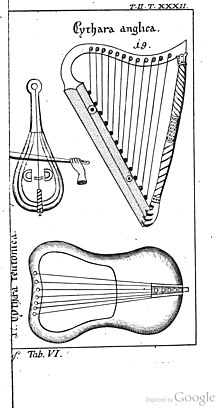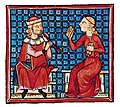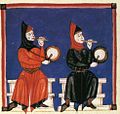List of European medieval musical instruments
Appearance
This article needs additional citations for verification. (February 2017) |
This is a list of medieval musical instruments used in European music during the Medieval period. It covers the period from before 1150 to 1400 A.D.
| Part of a series on |
| Medieval music |
|---|
| Overview |
|
|
Percussion
[edit]| Names and variations | Description | Ethnic connections, regions | Pictures | Pictures |
|---|---|---|---|---|
| Adufe[1] | A frame drum brought to Iberia by Muslims and played mainly by women.[2] Used in the charamba in Portugal, a circle dance for couples.[2]
The adufe is a square or rectangular frame drum usually made of pine, over which is mounted a goat's skin. The size of the frame usually ranges from 12 to 22 inches on each side, and 1 to 2 inches thick. The skin is stitched on the sides, with the stitches covered by a coloured ribbon. In the interior small seeds or small stones are placed to make pleasing sounds. |
Iberia
Porugul Spain |
 |
  |
| Bells |  |
 | ||
| Bumbulum (legendary) | ||||
| Clappers
cliquettes |
Clappers from the Carolingian Empire appear to have been disks or possibly chimes attached to sticks. Other versions were blocks of wood held in the palms. The palm-held blocks could make clicking and rattle noises like castanets. Other similar instruments worldwide include the Thai/Cambodian krap sepha, Indian/Nepali khartal, Uzbek/Tajik qairaq, or North African krakebs. |   |
  | |
| Cymbals |  |
  | ||
| *Frame drum | ||||
| Jew's harp[3] | ||||
| Nakers |  | |||
| Pandeiro[4] | ||||
| Tabor
Pipe and tabor |
 |
 | ||
| Tof | Tof was the Hebrew instrument which Miriam played, "most commonly translated" into English as timbrel[6] Near eastern origin, used by Gauls, Greeks, Romans (tympanum), Egyptians, Assyrians. [7] Jingles were probably originally separate from this instrument.[7] Also related to Daff.[7] |  |
 | |
| Triangle |  |
String instruments
[edit]| Names and variations | Description | Ethnic connections, regions | Pictures | Pictures |
|---|---|---|---|---|
| Citole[8][9] | ||||
| Cretan lyra | ||||
| Dulcimer | ||||
| Fiddle see also rabel, vielle, vihuela de arco |  | |||
| Gittern[9] |  | |||
| Guitarra latina | One writer has summed up the guitarra latina, which is not well defined, saying "For musicians in Alfonso’s time it may have meant only 'a plucked stringed instrument: not the Muslim one.'"[10] |  |

| |
| Guitarra morisca[11] |
  |
 | ||
| Medieval harp (Medieval form of the modern harp) |  |
 | ||
| Lute[12] |
 |
 | ||
| Lyre | ||||
| Organistrum (large form of medieval hurdy-gurdy) |   |
  | ||
| Psaltery |   |
  | ||
| Rabel | Fiddle, probably descended from rebec |   |
 | |
| Rebab
Rabé morisco |
Rebab is a word for various kinds of fiddle in the Muslim world. Spelling is loose, because Arabic does not write down vowels sounds. Rabab, rebab, rubab, ribab have all been used, and some of them are used for plucked instruments in Asia as well. |   |
  | |
| Rebec[14] |  | |||
| Rotte |  | |||
| Tromba marina | ||||
| Vielle |  | |||
| Vihuela de arco
Vihuela de arco pequeña (small bowed vihuela) |
 |
  | ||
| Zither |

Wind instruments
[edit]- Bagpipes[17]
- Bellows pipe
- Bladder pipe
- Bombard
- Buisine
- Crumhorn
- Flageolet
- Flute
- Gemshorn
- Organ
- Portative Organ
- Recorder
- Sackbut[18]
- Shawm[19]
- Tabor Pipe
- Zampogna
References
[edit]- ^ Gutwirth, Eleazar (1998). "Music, Identity and the Inquisition in Fifteenth-Century Spain". Early Music History. 17: 161–181. doi:10.1017/S0261127900001637. ISSN 0261-1279. JSTOR 853882.
- ^ a b Schechter, John M. (1984). "Adulfe". In Sadie, Stanley (ed.). The New Grove Dictionary of Musical Instruments. Vol. 1. p. 25.
- ^ The Jew's harp : a comprehensive anthology. Leonard Fox. Lewisburg: Bucknell University Press. 1988. ISBN 0-8387-5116-4. OCLC 16356799.
{{cite book}}: CS1 maint: others (link) - ^ Mauricio Molina (2006). Frame Drums in the Medieval Iberian Peninsula. pp. 101–. ISBN 978-0-542-85095-0. Retrieved 25 December 2012.
- ^ "TIMBREL - JewishEncyclopedia.com". Jewishencyclopedia.com. Retrieved 2016-05-13.
- ^ Sadie, Stanley, ed. (1984). "Timbrel". The New Grove Dictionary of Musical Instruments. Vol. 3. p. 585.
- ^ a b c Sadie, Stanley, ed. (1984). "Tambourine". The New Grove Dictionary of Musical Instruments. Vol. 3. p. 511.
- ^ [1] [dead link]
- ^ a b Baker, Paul. "The Gittern and Citole". Retrieved 4 December 2016.
- ^ Bouterse, Curt. "Medieval Instruments V: Fiddles – Curt Bouterse".
- ^ Galpin, Francis William (1911). Old English Instruments of Music. Chicago: A. C. McClurg and Company. pp. 21–22.
- ^ "A Panoply of Instruments for Medieval, Renaissance, and Baroque Music". Music Educators Journal. 65 (9): 38–69. 1979. doi:10.2307/3395616. ISSN 0027-4321. JSTOR 3395616.
- ^ Brown, Howard Mayer (1984). "Symphonia". In Sadie, Stanley (ed.). The New Grove Dictionary of Musical Instruments. Vol. 3. p. 483.
- ^ Spohnheimer. "The Rebec". Music.iastate.edu. Archived from the original on 2016-05-04. Retrieved 2016-05-13.
- ^ "Título uniforme [In Apocalipsin] Title Beati in Apocalipsin libri duodecim". bdh.bne.es. BIBLIOTECA DIGITAL HISPÁNICA. Retrieved 10 December 2016.
- ^ Cite error: The named reference
14-1was invoked but never defined (see the help page). - ^ Jones, G. Fenwick (1949). "Wittenwiler's "Becki" and the Medieval Bagpipe". The Journal of English and Germanic Philology. 48 (2): 209–228. ISSN 0363-6941. JSTOR 27713052.
- ^ Spohnheimer. "The Sacbut". Music.iastate.edu. Archived from the original on 2016-05-04. Retrieved 2016-05-13.
- ^ Spohnheimer. "The Renaissance Shawm". Music.iastate.edu. Archived from the original on 2016-05-25. Retrieved 2016-05-13.
This list of songs or music-related items is incomplete; you can help by adding missing items. (October 2021) |






















